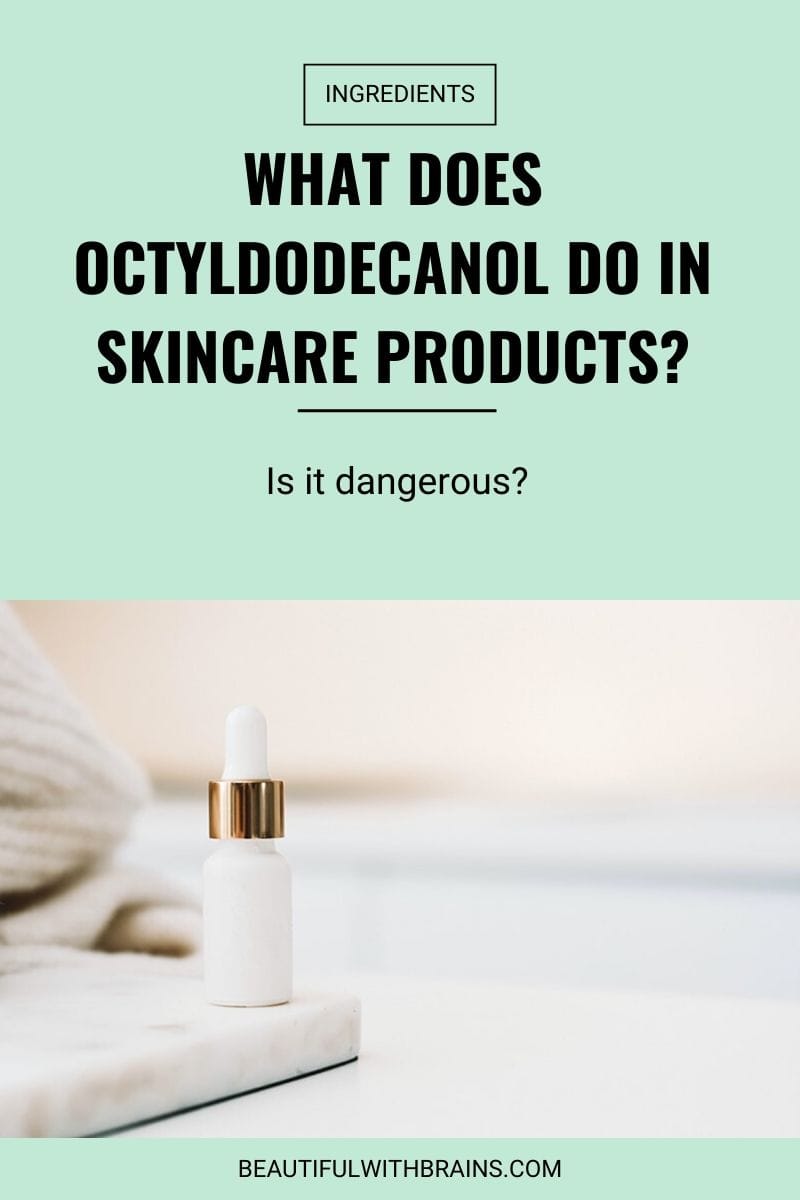
So, you’ve spotted Octyldodecanol in your skincare products and now you’re wondering…
What the heck is it?
What does it do for your skin?
Is it dangerous (I mean, it’s not natural…)?
Worry not. I’m here to answer all your questions. Let’s get started:
What Is Octyldodecanol?
Octyldodecanol is a long chain fatty acid. It looks like a clear, colourless liquid. It can be synthetic or derived from plants.
What Does Octyldodecanol Do In Skincare Products?
Octyldodecanol has several jobs in skincare products:
- Anti-foaming: It helps reduce the tendency of products to foam when they’re shaken.
- Emollient: It makes skin silky soft to the touch.
- Emulsifier: It helps keep formulas together, preventing the oily and watery parts from separating.
- Texture-enhancer: It gives the textures of skincare products a better slip, so they can glide smoothly on the skin.
- Solvent: It’s rarely used for this, but it can dissolve other skincare ingredients.
Octyldodecanol is there more for the product than for your skin. It can make skin softer and smoother, but it mostly helps to create skincare products that are a pleasure to use.
Want to know what ingredients you really need to avoid in your skincare products? Sign up to the newsletter below to receive the “Skincare Ingredients To Avoid” cheatsheet:
What Are The Best Products With Octyldodecanol?
- La Roche Posay Redermic R Anti-Aging Concentrate Intensive ($56.99): Available at Dermstore
- Murad Retinol Youth Renewal Night Cream ($82.00): Available at Cult Beauty, Sephora, and Ulta
- Sunday Riley Ceramic Slip Cleanser ($35.00): Available at Cult Beauty, Dermstore, Sephora and SpaceNK
Does Octyldodecanol Has Any Side Effects?
Octyldodecanol can cause irritations even in low doses, but it’s rare. Unless you have sensitive skin, I wouldn’t worry too much about it.
The Bottom Line
Octyldodecanol is an emollient and emulsifier that improves the texture of your skincare products and makes your skin softer and smoother.
What are your thoughts on Octyldodecanol in skincare? Share them in the comments below.


Thanks for the information Gio. As for the irritaions, does that apply on the amount of Octyldodecanol or does it not matter?
.-= Dee´s last blog ..Release The Frustration. + Revlon Double Twist Mascara Review =-.
HI, Fatty alcohol’s like Phenoxyethanol and the Octyldodecanol cause me to break out. I have oily and acne-prone skin and reading online reviews from all sorts of organic and natural products, people keep saying that this ingredient will break you out. My question is, Is this true for the Octyldodecanol?
Christina, I don’t think it is. I’ve never had problems with it and I could find no proof in the scientific literature that it causes breakouts.
Per the EWG website, octyldodecanol is listed as a potential irritant for products used around the eyes and on the skin. I learned this the hard way, after having a reaction to Drunk Elephant’s Shaba Complex Eye Serum, which lists octyldodecanol as the second ingredient. My allergic reaction built up over time, occurring during my second bottle of Shaba.
Greta, I’m sorry this happened to you. Unfortunately, everything could potentially cause an allergic reaction in someone. 🙁
Dee, you’re welcome. It depends on the amount too. Usually Octydodecanol is used in very small concentrations in cosmetics and skincare products so it shouldn’t be irritating. But if one is very sensitive to the ingredient I guess even small concentrations may be enough to irritate skin. But that is really rare.
I am applying Clotrimazole USP, 1 % to my split corners of my mouth. Now I have red itchy bumps on my chin. I am highly allergic to Vit E on my skin, but could the Octyldodecano ingredient be aggravating my skin. I am not sure if the Clotrimazole has vit. E in it.
Beverly, split corners of your mouth are a sign of B vitamin deficiency. Visit a health food store the next time this is a problem and ask them for a high-quality B complex supplement.
beverly, split corners are a sign of GAPS. Gut and Physiology Syndrome.
There are more causes than vitamin deficiency for your symptoms, to beging with you don’t say if you wear dentures or not? Poor fitting teeth or dental problems can also cause the corners of the mouth to split. Plus I’ve read that the ingredient can cause the reaction of other irritating ingredients to be intensified. So it’s not just about how that ingredient behaves but how it interacts with others.
Hi Beverly. Well, that’s hard to say. Everyone’s skin is different and each ingredient in any product could potentially cause an irritation to someone. If you have used products with Octydodecanol before and they didn’t give you problems, it’s unlikely that’s the cause. If, on the other hand, this is your first time using Octydodecanol, that’s what could be aggravating your condition. But unless you consult a dermatologist there’s no way to know for sure. Clotrimazole USP, 1 % shouldn’t contain any Vitamin E, though.
Is Octyldodecanol derived from beeswax
Sharn, it can be derived from beeswax esters, yes.
I know this article is really old, but recently I had a skincare consult from a lady who owns a skincare company and she went through all ingredients in my current products. She told me that OCTYLDODECANOL is a sunscreen ingredient that was hiding in my physical sunscreen and she thought that it might be causing me sensitivity that is leading to my melasma. I have searched all over and kind find anything confirming what she said. I’m confused??
Andrea, maybe she got it confused with oxybenzone or octocrylene? These are chemical UV filters that can cause irritations. Octyldodecanol can cause irritations, but it’s very, very rare.